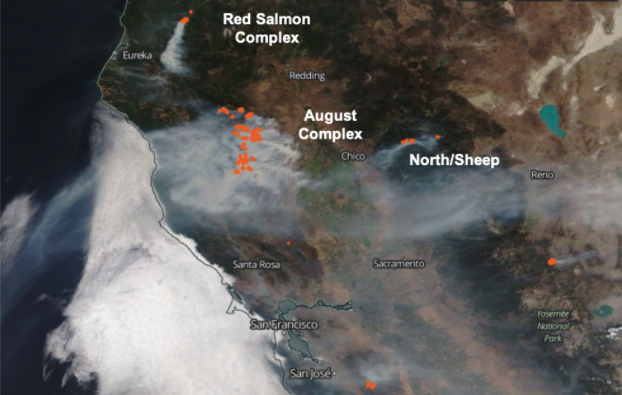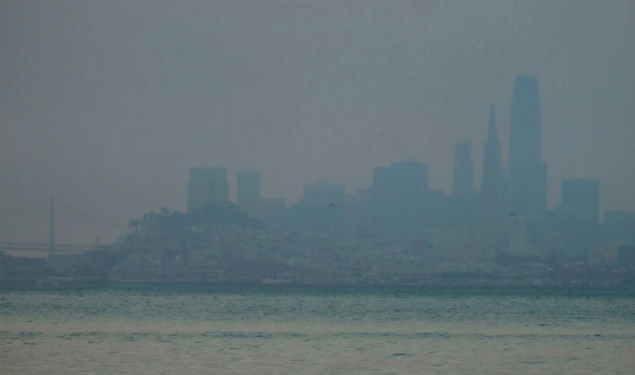In our last article we talked about preparing your yard and home to be better protected from wildfires and how to seal your home windows and doors from a smoky outdoor environment. In this blog we will be exploring air filters for your home’s HVAC and air purifiers for rooms in your household. As grass fires are already present let’s get started on seriously thinking about lung health and what masking-up could look like before air quality conditions worsen.
This photo shows San Francisco, as seen through thick smoke from Sausalito, on August 19, 2020. You probably recall those all-day, orange-colored skies, last year. We may see them again, and if we do, we will need to protect ourselves and our families from unhealthy air.
Around our home (which can normally have more unhealthy indoor air than outdoor air), we may have already done what is necessary to help keep out the smoky air from wildfires in CA (see previous article).
Maintaining Healthy Indoor Air: Room Air Purifiers and HVAC Filters
Healthy and breathable living spaces indoors are crucial in times of poor outdoor air quality. One thing to note is that a room air purifier may help only one specific room. If you and your family intend to spend time in multiple rooms throughout your home, it is recommended that each room have its own air purifier. An alternative would be to temporarily limit your needs for space and live in only a few rooms in your home until outdoor air quality improves.
 Northern CA, as seen from the Moderate Resolution Imaging Spectroradiometer (MODIS) aboard NASA’s Terra satellite, on Aug 31, 2020.
Northern CA, as seen from the Moderate Resolution Imaging Spectroradiometer (MODIS) aboard NASA’s Terra satellite, on Aug 31, 2020.
The Bay Area Air Quality Management District suggests buying a “non-ozone producing air purifier (HEPA) to create a cleaner air room in the home” or having “a MERV 13 (or greater) filter for your home’s central HVAC system (Heating, Ventilation, Air Conditioning), to be used when experiencing a heavy smoke event.”
Consumer Reports offers a ‘buying-guide” with helpful tips on air purifier functions and brands. Locally, you should be able to find air purifiers at many hardware stores, and the Berkeley Vacuum & Sewing Center sells one brand of air purifier. You’ll want to run a small air purifier (filter) in the room where you spend the most time, for example, a bedroom. If you live in an apartment building, a room air purifier is also likely to be your best option, as you may not be able to control the central air system.
If your home happens to have a central air HVAC system, make sure that the filter is clean and that you are exchanging as little indoor air for outdoor air as possible. MERV 13 filters are inexpensive, running less than $10 per filter, and are usually sold in multipacks. It is only necessary to use a MERV 13 filter in your HVAC system during a smoke event, and not at all times (the higher the MERV rating, the higher the air filtration capabilities of a particular filter). In addition, make sure that your home’s HVAC system is running on “recirculate” to not bring smoky air from the outside, indoors. Many local heating and air conditioning businesses will help you with large, in-house air filtration systems, if you wish to invest in that manner.
Do-It-Yourself Room Filtration System
You might also wish to build your own, single-room, air purifying system (and you can!) with DIY videos online. Here is a simple and very effective DIY air filtration system video. Be aware that as time goes on, more dirt, dander, mold, and dust will be trapped by any filter that you are using which reduces air flow. It will be important for you to replace your air filter every two to three months to allow for proper air flow and to see no decrease in filtration functionality.
Masks: Help Filter Indoor Air
Wildfire smoke can irritate your lungs, cause inflammation, affect your immune system, and make you more prone to lung infections. This includes SARS-CoV-2, the virus that causes COVID-19. “Because of the COVID-19 pandemic, preparing for wildfires might be a little different this year”, says the CDC. Cloth masks, used to slow the spread of COVID-19 by blocking respiratory droplets, offer little protection against wildfire smoke. Cloth masks do not catch small particles in smoke that can harm your health. Similar to previous smoky seasons that posed lung health and air quality concern, a N95 or better rated mask is encouraged, but please also keep in mind that such masks are still in high demand and prioritized to protect healthcare workers and emergency services personnel (due to the Covid-19 virus).
Check out Alameda County Public Health Department’s Wildfire Smoke and Your Health FAQs.
For news and updates on CA fires, you can visit Wildfire Today.
This article was written by James Hosley of the Ecology Center Help Desk.




